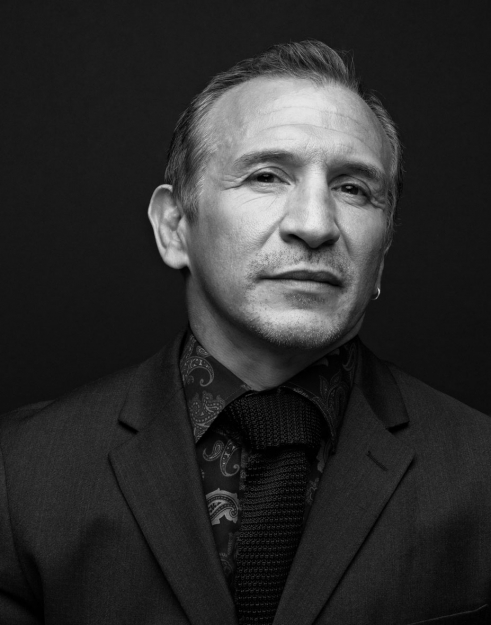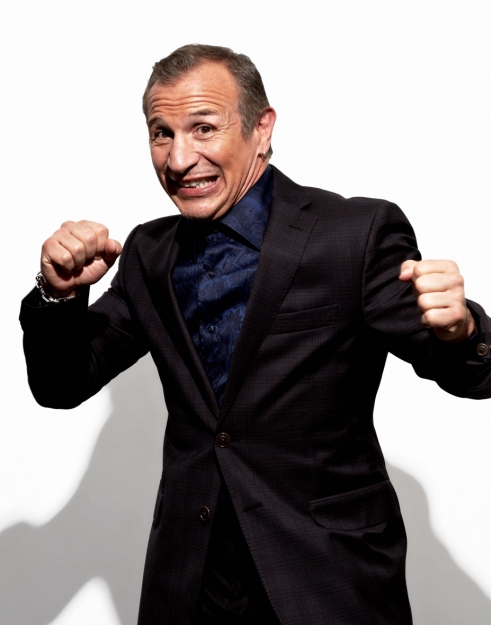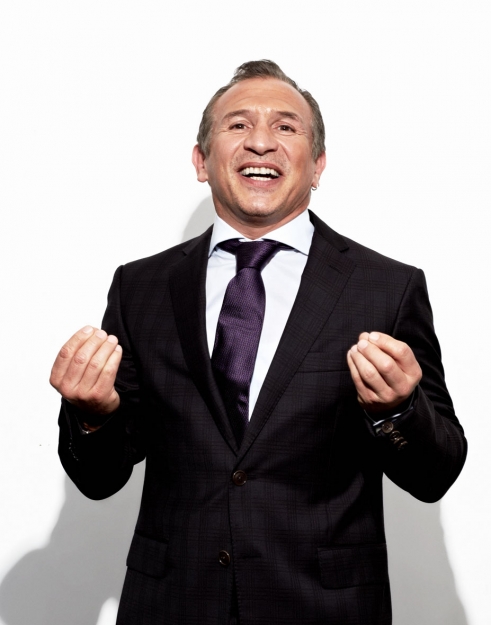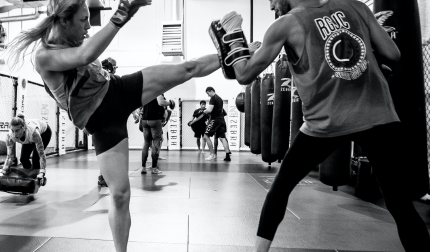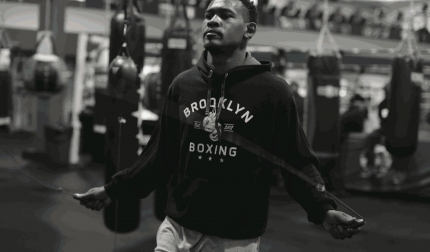In boxing, the story usually ends badly. Broken noses, broken brains, broken families, broken dreams. It’s hard to call it a cautionary tale when it is the rule instead of the exception. Thankfully, Ray Mancini has always been exceptional. Decades after he lived on Central Park West and trained in the Times Square Boxing Gym, Ray “Boom-Boom” Mancini strides down a New York City street as though he never left. Still looking as though he can make weight, (“I still have four rounds in me,” he says.) Mancini greets us with a hearty handshake. Sharply dressed, Mancini still maintains a championship stature at all times.
Today, he is in town to promote The Good Son, an incredible documentary based on his life and the astonishing biography written by Mark Kriegel. When you see Mancini interact with strangers, it’s readily apparent that he has maintained his humble nature. He introduces himself and makes eye contact with everyone. He’s more eager to hear your stories than to tell his own. So why now, 25 years after his boxing career came to an end, was it time to tell his story?
“For years, people were telling me to write a book,” Mancini says. “ I would always say, ‘Let me live a life first.’ When Mark Kreigel approached me, I told him I can’t imagine what you’re going to say that hasn’t been said already. But Mark said, “No, I got it. This is a book about fathers and sons.’ He said, ‘Look, I can’t pay you anything; you’ll have no say in what I write, and I’m going to take you to every dark place you ever went. But you have to trust me, if you want the best book written about fathers and sons, I’m your guy.’ So I said, ‘Let’s do it.’”
What Kriegel understood as one of the incredible sports biographers of our time is that if the true measure of a biography is to show what makes someone tick, there was no way to tell Ray Mancini’s story without telling Lenny Mancini’s story first.
As a kid in Youngstown, Ohio, Lenny Mancini rapidly gained a reputation as being an undefeatable street fighter. During the Depression, Lenny Mancini’s uncle would take him out to the streets and try to make impromptu fights with the sons of other residents. To hype the fights, Mancini’s uncle would smack Lenny across the mouth. “Look,” he would say, ‘the kid doesn’t even cry.”
Lenny Mancini would eventually move to New York City to become a lightweight fighter. Under the direction of legendary trainer, Ray Arcel, Mancini, who would become known as “boom-boom” for his relentless punching style, worked his way up to the Number 1 contender spot in the lightweight division. When World War II began, Lenny was drafted into the Army. The title would have to wait.
While serving in France, Lenny Mancini was injured by an exploding shell. His shoulder was broken. He fractured his left arm. Remnants of the shell settled near his spine. After coming back from the war with a Purple Heart, his injuries made it difficult for Lenny Mancini to make weight in the lightweight division. At five-foot-one, Lenny was battling middleweights several inches taller than him. The championship dream faded away.
As a boy, Ray Mancini would delight in hearing the many boxing stories of his dad. In Youngstown, Ray was developing a reputation for being a young athlete on the rise. The Toronto Blue Jays wanted to sign him to a professional baseball contract. And in a state where football is king, his high school coaches implored Ray to put on more weight so that he could play running back in college and beyond. “Put on weight?” Ray would remember telling them. “I have to make weight.”
Lenny Mancini didn’t want Ray to become a fighter. “Ray, it’s a painful lonely life,” he said. “I had to fight. It was the Great Depression. You don’t need this. You have other opportunities.” But Ray wouldn’t be denied. “I want to win the title,” he told his father. “I want to win it for you.”
At 18 years of age, Ray Mancini turned away the thoughts of college athletic scholarships and became a pro boxer. He moved to New York City and lived on his trainer’s couch, training like any other pug. After starting his career at 19-0, the new Boom-Boom dominated a much more experienced Jose Luis Ramirez for the NABF lightweight championship. He was now staring down a title shot with WBC Lightweight Champion, Alexis Arguello, one of the greatest fighters of all time. He was only 20 years old.
At the time, Youngstown, Ohio wasn’t a pleasant place to be. Steel mills were closing and it seemed that people were losing their jobs on a daily basis. At a time when all hope seemed lost, here came one of their own sons. On October 13, 1981, Ray Mancini, a real life Rocky, stepped into the ring of Bally’s Park Place Hotel and Casino in Atlantic City, ready to defend his family name and the honor of his city.
In the early rounds, Mancini surprised Arguello with the relentless attack that gave Lenny Mancini the original Boom-Boom nickname. He surged out in front early on the scorecards. But as the fight wore on, Arguello’s experience came into play. Towards the later rounds, his punches were finding Mancini with greater frequency and efficiency. And when they go to the “championship rounds,” Mancini seemed to be tiring faster than the clock was willing to move. In the 14th round, two strong left hooks and a straight right hand sent Mancini down to the canvas. Referee Tony Perez stopped the fight. It was the first time Ray Mancini had ever been stopped. “I want to apologize to the people of Youngstown,” Ray said after the fight, humiliated that he couldn’t redeem his father’s dream. But Lenny Mancini couldn’t have been prouder of his son.
“I never thought I would get another chance at the title,” Mancini remembers. “My dad was such a great fighter and he never got a chance. I knew how hard it was to get there, even at that age. My dad would always tell me, ‘Ray, one day you’re the headline, the next day, you’re on the bread line. It’s a short trip from the limo to the curb.’ I was devastated when I lost.”
Despite the loss, Mancini impressed the boxing world. He’d gone toe-to-toe with one of the world’s greatest fighters and didn’t back up. After two more fights, Mancini would get another chance at the title in May of 1982 against Arturo Frias. And he wasn’t about to let this one get away.
After Frias staged Mancini with a left hook, Mancini came back with a fury. After trading punched relentlessly with Frias, a left hook to the nose sent Frias to the canvas. After getting to his feet, Frias tried to steady himself against the ropes, but Mancini wouldn’t let up, throwing over 30 punches that were unreturned by Frias. Referee Richard Greene stopped the fight. The championship belt belonged to Mancini. Ray hugged his mother and father in the ring, weeping openly.
The world was beginning to discover the Boom-Boom phenomenon. At age 21, he was the reigning Lightweight Champion of the world. With network television discovering the increasingly entertaining action-packed style of the lighter divisions, CBS made Mancini one of their Saturday matinee stars. Everyone wanted to be near Mancini, including the Godfather of Vegas himself, Frank Sinatra. And with Sugar Ray Leonard going into early retirement due to an eye injury, corporate America was lining up in Mancini’s corner as well. And then the unthinkable happened.
On November 13, 1982, Ray Mancini stepped into the ring set up in the parking lot of Caesar’s Palace in Las Vegas to fight contender Duk-koo Kim. The night before, Manicni’s former opponent, Alexis Arguello was knocked unconscious by Aaron Pryor in the fourteenth round of a fight at Miami’s Orange Bowl. Arguello lied unconscious in the ring for several minutes, a cruel reminder that boxing is much more than just a sport, it can be a battle of life and death.
Several celebrities were in attendance to support Mancini, including Frank Sinatra who would be performing at Caesar’s later that evening and had taken a personal liking to Mancini. Bill Cosby would find his way to Mancini’s corner to shout instructions to the disbelief of Mancini’s trainers.
The pace of the fight combined with the desert heat made the fight one of the most grueling in memory. For the viewers, it was everything they had come to expect from a Mancini fight. Each round, he would come out slugging away, eating one punch for every two he could get off. And then, inexplicably, in the last thirty seconds of each round, Kim, a virtually unknown fighter in the US from South Korea would come storming back. Every time Mancini thought he had finally unleashed enough blows to stop his opponent, Kim would rise up to fight again. “It was the only time I ever thought about quitting in the ring,” Mancini remembers.
Just a few seconds into the 14th round, a Mancini combination sent Kim sprawling to the canvas. With his brain probably already hemorrhaging, Kim grabbed the ropes and pulled himself up in an attempt to resume fighting. Referee Richard Greene immediately stopped the fight. Fans rejoiced in one of the most heroic fights they had ever seen between two warriors. As Kim kept slipping off of his stool, his trainers called for a stretcher to take him to an ambulance. It wasn’t until well after the fight was over that Mancini was informed of how dire Kim’s condition was.
That night, to a sold out crowd, Frank Sinatra greeted his audience to start his show. “Ladies and gentlemen,” Sinatra said, “this afternoon I saw the greatest fight I’ve ever seen. And he’s here with us, my friend, the lightweight champion of the world, Ray Boom-Boom Mancini.”
As Mancini forced a smile and waved to the crowd, he was simultaneously at the peak and the valley of his career. While no one in the audience knew that death was imminent for Kim, Mancini was already struck by grief for what he had done in the ring. Lenny Mancini, as only a boxer could understand, told his son, “Raymond, thank God. It could have been you.”
The death in the ring resonated across America. It dominated the front pages of papers instead of the back pages. People called for the abolition of boxing. Weeks later, when Randall “Tex” Cobb suffered a one-sided beating at the hands of heavyweight champion Larry Holmes on national television, Howard Cosell announced on air that he would no longer announce boxing matches any more. Though he had done nothing wrong, Mancini went from the symbol of everything that is right with boxing—a young man fighting valiantly to defend the honor of his family and his hometown—to everything that is wrong with a brutal sport. CBS got cold feet with broadcasting the sport. Those national endorsement deals slipped away. Mancini would defend his title a few more times, but his heart wasn’t in it anymore.
Mancini would retire from the sport at age 24, coming back only twice to see if he could reignite the passion. He could not. He moved to Los Angeles and got into the entertainment business. He started a family. He’d stored away enough money to live comfortably and to start a new dream. But everywhere he went, the old dream followed him.
“People would come up to me and ask me, ‘So what’s it like to kill a guy?’” Mancini says. “I could handle it. But kids at school would say things to my kids. My daughter came home from school one day and she was so upset, so I decided it was time to show her the fight. She watched the fight and she said, ‘But Papi, you didn’t do anything wrong!’”
“And that’s the thing about the fight,” Mancini says. “Other than the outcome, it was a great fight. It would be one of those fights that you would be watching on ESPN Classic. Everyone there, both fighters and the referee, we conducted ourselves admirably. In the 13th round, I’m throwing punches and you can see, he’s moving, he’s rolling with them. Then he pushes me back and starts throwing punches. That was the strength of Kim’s character. In the 14th round, he comes out and after an exchange of punches, I catch him and he goes down. The doctor said it had to be the last punch that caused the damage, because there would have been no way for him to continue fighting with that kind of injury. It had to be the last punch.”
In the course of tirelessly researching the book, Mancini’s biographer Mark Kriegel traveled to South Korea to speak to the people that knew Duk-koo Kim best. He met Jiwan Kim. At the time of the fight, Duk-koo Kim’s wife, Young Mee, was pregnant with Jiwan. For years, Young Mee told her son that his father was abroad making money for the family. It wasn’t until he was a teenager that he discovered the truth about his family history. Jiwan mentioned to Kriegel that he would like to meet Mancini. Mancini agreed. Young Mee and Jiwan came to the United States to meet Manicni as well as his sons Ray Ray, Leonardo and daughter, Carmenina. The meeting is captured in the climatic scene of the documentary on Ray’s life.
“I felt it was important for Jiwan to meet me, the last person that was in the ring with his father. But also it was important for me to meet him, because I wanted him to understand. It was important for me to know him and for him to know me, to know a little bit about what I’m about and my children. So when they came, and they had the cameras set up, they told me that Jiwan and Young Mee were 10 minutes away, and I said to Jesse my camera man, ‘We’ve got one shot to do this. I am not going to do this again. There ain’t going to be a take two. Let it roll. What you see is what you get.”
And in that, Ray Mancini described his life. You get one shot at what you want and you have to take advantage of that. Now living happily in Santa Monica with his three teenage children, Ray Mancini is at peace regardless of what anyone else thinks the ending to his story should have been. He’s determined to make his ending a happy one. It’s one of the things he’s learned after all of these years in the entertainment business. And if you are fortunate enough to see The Good Son on the big screen, there is one thing that is clear when you meet Ray Mancini. He remains true to himself. What you get is what you get.


